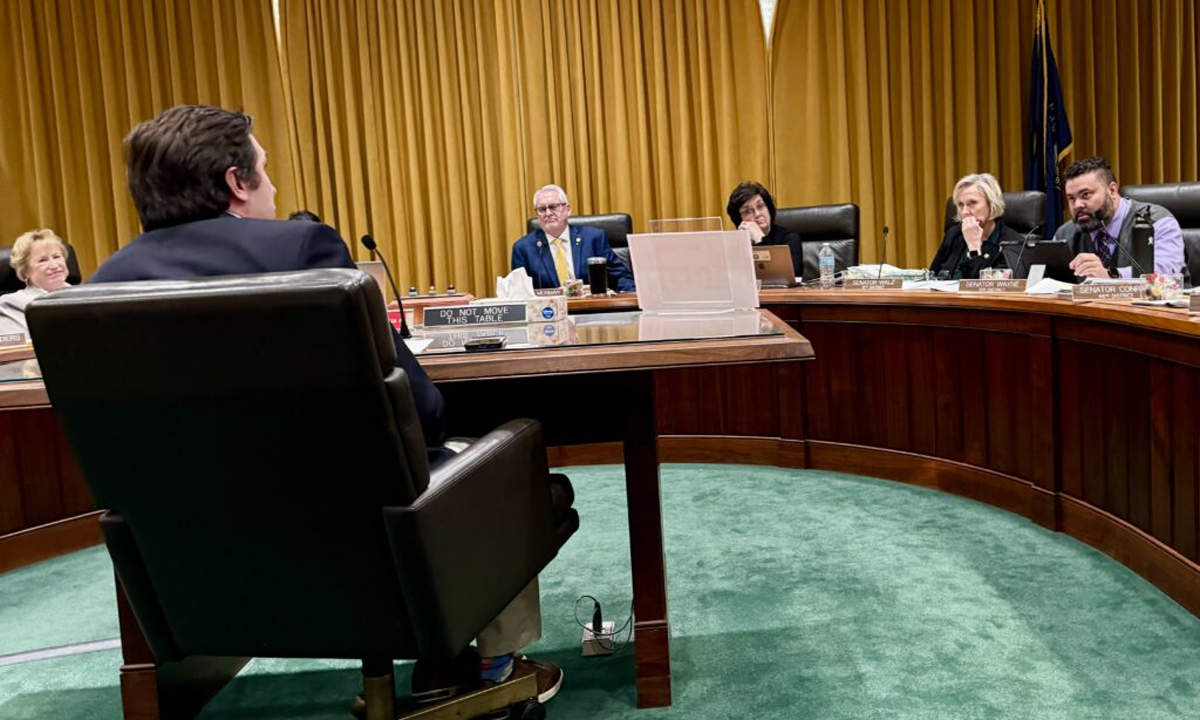Bill Would Start Nebraska K-12 Voucher Program With $1,500 a Year
Opponents say appropriation would violate the State Constitution ban on public funds for private schools.

Get stories like this delivered straight to your inbox. Sign up for The 74 Newsletter
LINCOLN — The next front in Nebraska’s school choice fight could shift toward a proposal by State Sen. Ben Hansen of Blair under which the state would deposit $1,500 a year per student into a new type of state-managed savings account for parents and guardians of students attending private K-12 schools.
Using the language of national school choice advocates, Hansen said his goal is to “fund students, not systems.” He said he has seen other states such as Iowa and Arizona use similar plans to subsidize private school costs.
“Parents are the primary educators of their children, not the government,” he told the Legislature’s Education Committee on Tuesday. “Our role should assist parents in that job.”
Legislative Bill 1386 would let people use the funds for private school tuition, textbooks, school supplies, therapies, books and academic materials approved by the Nebraska Board of Education. The new educational savings accounts for approved or accredited private K-12 schools would begin in the 2025-26 school year.
The accounts would be overseen by the Nebraska State Treasurer’s Office. But the accounts would offer no tax advantages like the tax-free 529 college savings plans the Treasurer’s Office currently oversees. Instead, under LB 1386, these accounts would act as pass-throughs for state appropriations into a school choice fund that would be created, invested and managed by the state.
One Fremont-area father testified about his difficulties getting a public school to accept his option-enrollment daughter with moderate hearing loss, because she had an individualized education program, or IEP. He and others said the voucher program would make it easier for them to afford private school.
Opponents testified that they wanted public dollars spent on public schools.
Critics point to constitution
The fiscal note said if 80% of Nebraska’s 33,611 private school students applied for the fund it could cost the state $40 million.
The note also estimated the State Treasurer’s Office would need $300,000 to administer the accounts. That includes the costs of an auditor to make sure the funds are properly spent.
Critics of the voucher push said the plan would violate the Nebraska Constitution’s Article VII, Section 11, which says, “No appropriation or grant of public funds or property shall be made to any educational institution which is not owned and controlled by the state or a governmental subdivision thereof.”
Royers said private schools would receive public money, an issue opponents raised last year about the new Opportunity Scholarship Act.
Hansen, reached after the hearing, disagreed. He and State Sen. Lou Ann Linehan of Omaha said the U.S. Supreme Court has ruled that state funds can be used this way three times. He explained the Nebraska workaround: The state will be giving state tax dollars to parents and not to private schools, he said.
He said he proposed starting with $1,500 a year because that’s how much state lawmakers funded last year as a baseline level of state aid per public school student. Iowa last session expanded its student savings account for private school students to the full cost of state aid per K-12 student, $7,598 a year.
Royers said other states starting similar voucher programs have learned that the programs largely help offset the costs of students already attending private schools. He said they don’t often create a large influx of new students from public schools who couldn’t otherwise afford to attend. Private school students in Iowa and elsewhere often see large increases in private school tuition rates once state support increases, he said.
And the funding lost to public schools leaves public school students and districts in worse shape, Royers said.
“We should be learning from the mistakes coming out of other states…,” Royers said. “This does not help needy families. It helps private schools.”
Wayne questions Royers
State Sen. Justin Wayne of Omaha, a school choice advocate, asked Royers why it was OK for the state to subsidize private preschool education and private higher education but not K-12.
“Is there something special about those years?” he asked, after Royers did not answer the first few times he asked.
A representative of the Holland Children’s Movement shared data from its 2023 poll indicating more than 60% of Nebraskans opposed subsidizing private schools with public funding.
Linehan and Education Committee Chairman Dave Murman said they had seen polling that found the opposite, indicating broad statewide support for school choice programs.
“It depends on how you ask the question,” Linehan said.
Hansen expects the bill to reach the legislative floor this session. Bill opponents, including the NSEA, say they will be ready.
Nebraska Examiner is part of States Newsroom, a network of news bureaus supported by grants and a coalition of donors as a 501c(3) public charity. Nebraska Examiner maintains editorial independence. Contact Editor Cate Folsom for questions: info@nebraskaexaminer.com. Follow Nebraska Examiner on Facebook and Twitter.
Get stories like these delivered straight to your inbox. Sign up for The 74 Newsletter

;)